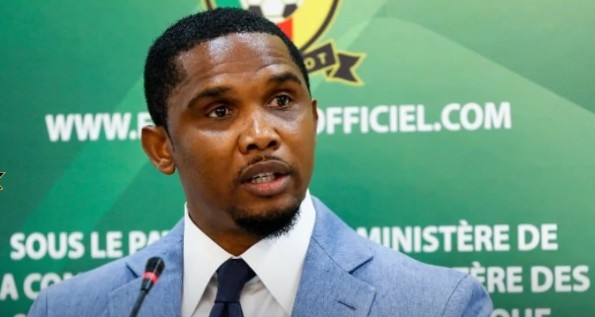CameroonOnline.ORG | The ongoing dispute over the dismissal of former Indomitable Lions coach Antonio Conceição has resurfaced, following a statement from Cameroon’s Ministry of Sports and Physical Education (MINSEP) regarding the payment of compensation owed to the Portuguese coach. In response, the Cameroonian Football Federation (Fecafoot), led by Samuel Eto’o, has issued a press release clarifying its position and addressing what it considers inaccuracies in MINSEP’s communication.
Government Support Acknowledged but Facts Must Be Set Straight
Fecafoot began its statement by expressing gratitude to the Cameroonian government, particularly President Paul Biya, for stepping in to cover the compensation, amounting to 1,212,336,810 FCFA. The Federation acknowledged the government’s continued support for Cameroonian football and recognized the financial burden that the settlement represented.
However, Fecafoot took issue with the way the situation was framed by MINSEP. The Ministry’s statement suggested that Fecafoot was solely responsible for the termination of Conceição’s contract, a claim the Federation firmly refutes.
A Decision Made at the Highest Level
Fecafoot insists that the termination of Antonio Conceição’s contract was not an independent decision on its part. Rather, it was an action approved by President Paul Biya and carried out in collaboration with the relevant administrative bodies.
“The termination of the contract of Coach Antonio Conceição and his entire staff due to insufficient results was approved by the Very High Agreement of the President of the Republic and implemented by all the Administrations concerned at a meeting convened for this purpose by the Minister of Sports on July 14, 2022,” the statement from Fecafoot reads.
By emphasizing this point, Fecafoot aims to dispel the notion that it acted impulsively or irresponsibly in dismissing the Portuguese coach. Instead, it argues that the decision was a collective one involving top government officials.
Fecafoot’s Role in the FIFA Case
Another key point of contention is the notion that Fecafoot was solely to blame for the legal battle that led to FIFA ordering the compensation payment. The Federation clarifies that it was condemned by FIFA because it is the sole recognized interlocutor for Cameroonian football matters, not because it unilaterally made the decision to terminate the contract.
“It is therefore unhealthy to try to blame Fecafoot for the unilateral termination of Coach Conceição’s contract and the ensuing lawsuit,” the Federation stated.
This clarification serves to highlight a broader issue that Fecafoot is attempting to address: the ongoing tensions between the Federation and MINSEP.
A History of Costly Dismissals
Fecafoot also pointed out that Conceição’s dismissal was not an isolated case. The Federation recalled that several former Indomitable Lions coaches—including Javier Clemente, Volker Finke, Hugo Broos, and Clarence Seedorf—had their contracts terminated under similar circumstances.
The statement suggests that the real issue is not the dismissal itself but the manner in which these contracts are negotiated. Fecafoot claims that in the past, these agreements were concluded without its involvement, leading to significant financial burdens on the state. The Federation noted that the only coach whose contract was properly negotiated with its input—Rigobert Song—was dismissed without triggering a legal battle.
MINSEP’s Comments Called into Question
Fecafoot also took issue with the tone and content of the statement issued by MINSEP’s communication unit. The Federation accused the Ministry of fueling unnecessary discord in Cameroonian football, rather than following President Biya’s recent call for unity and harmony.
“The comments made by the Head of MINSEP’s Communication Unit… are part of a permanent desire on the part of the officials of this ministerial department to instrumentalize and incite certain coaches and players in Cameroonian football to distrust Fecafoot,” the Federation stated.
Fecafoot urged all stakeholders to respect the President’s appeal for unity and to refrain from actions that could further divide Cameroonian football.
A Call for Reconciliation and Proper Governance
In concluding its response, Fecafoot reiterated its commitment to rational and transparent governance. The Federation maintains that all of its decisions are made in the best interest of Cameroonian football and based on sound legal and ethical principles.
While the dispute over Conceição’s compensation may have been settled financially, the rift between Fecafoot and MINSEP remains evident. Moving forward, the Federation calls for a spirit of cooperation, emphasizing that the success of the Indomitable Lions and Cameroonian football as a whole depends on unity among all key stakeholders.
As the dust settles on this latest controversy, one thing is clear: the governance of Cameroonian football continues to be a high-stakes affair, where administrative conflicts can be just as intense as the battles on the pitch.
